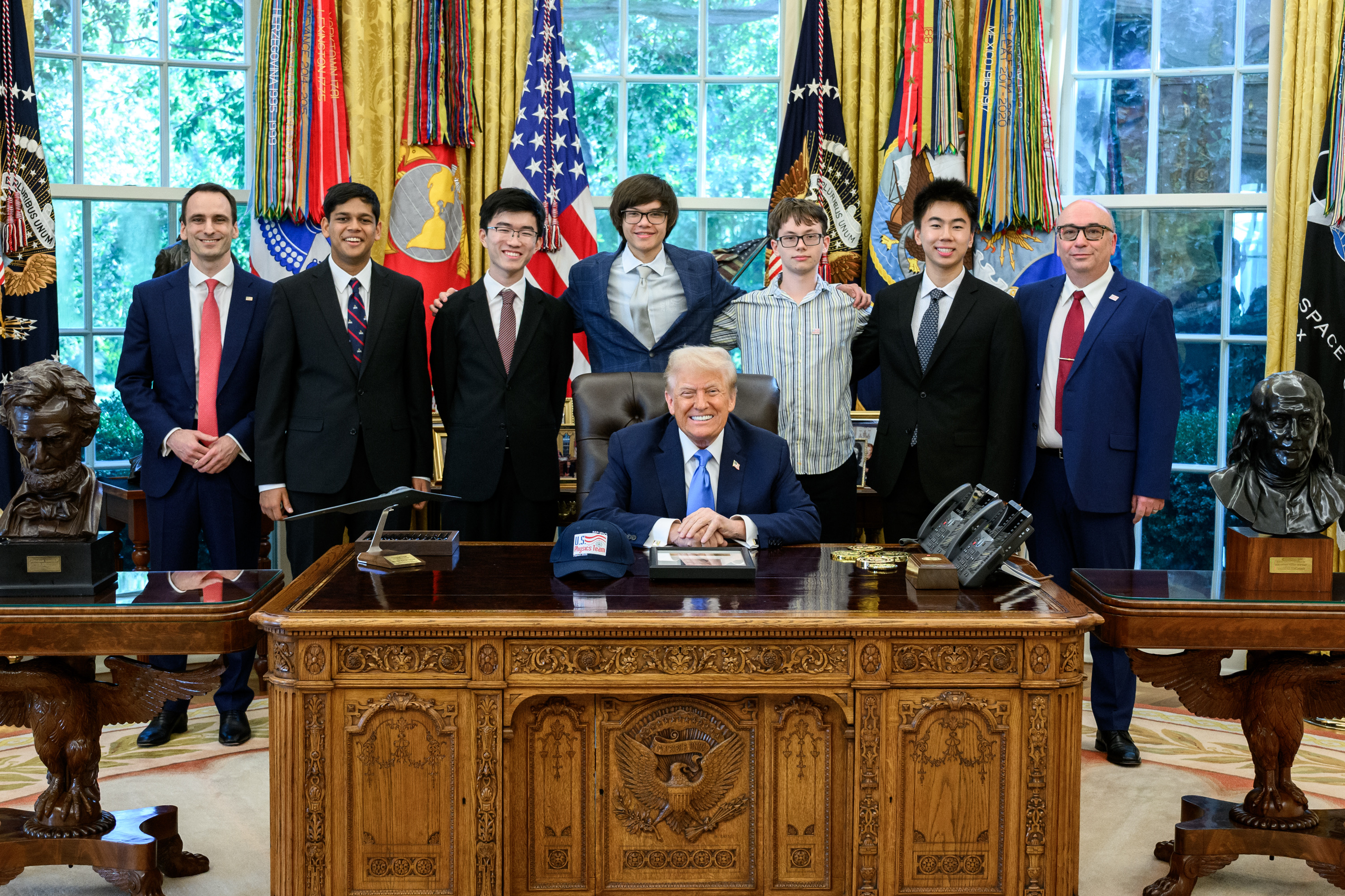
The U.S. Physics Team and their coaches are welcomed to the Oval Office to celebrate their international victory. (Official White House Photo)
Honored at the White House for a historic five-gold-medal victory in Paris, the U.S. Physics Team's success was forged in a final, intensive training session on the UC Santa Barbara campus.
Excellence in physics education at UC Santa Barbara, from the Department of Physics to the College of Creative Studies (CCS), was on the world stage this summer as teaching professor Tengiz Bibilashvili led the United States Physics Team to a dominant international victory. At the 2025 International Physics Olympiad in Paris, the five-member team became the only nation to secure five gold medals, besting top students from 85 other countries. Just days before flying to France, Bibilashvili brought the nation’s brightest high school minds — Agastya Goel, Allen Li, Joshua Wang, Feodor Yevtushenko and Brian Zhang — to UCSB for a crucial, high-stakes training session.
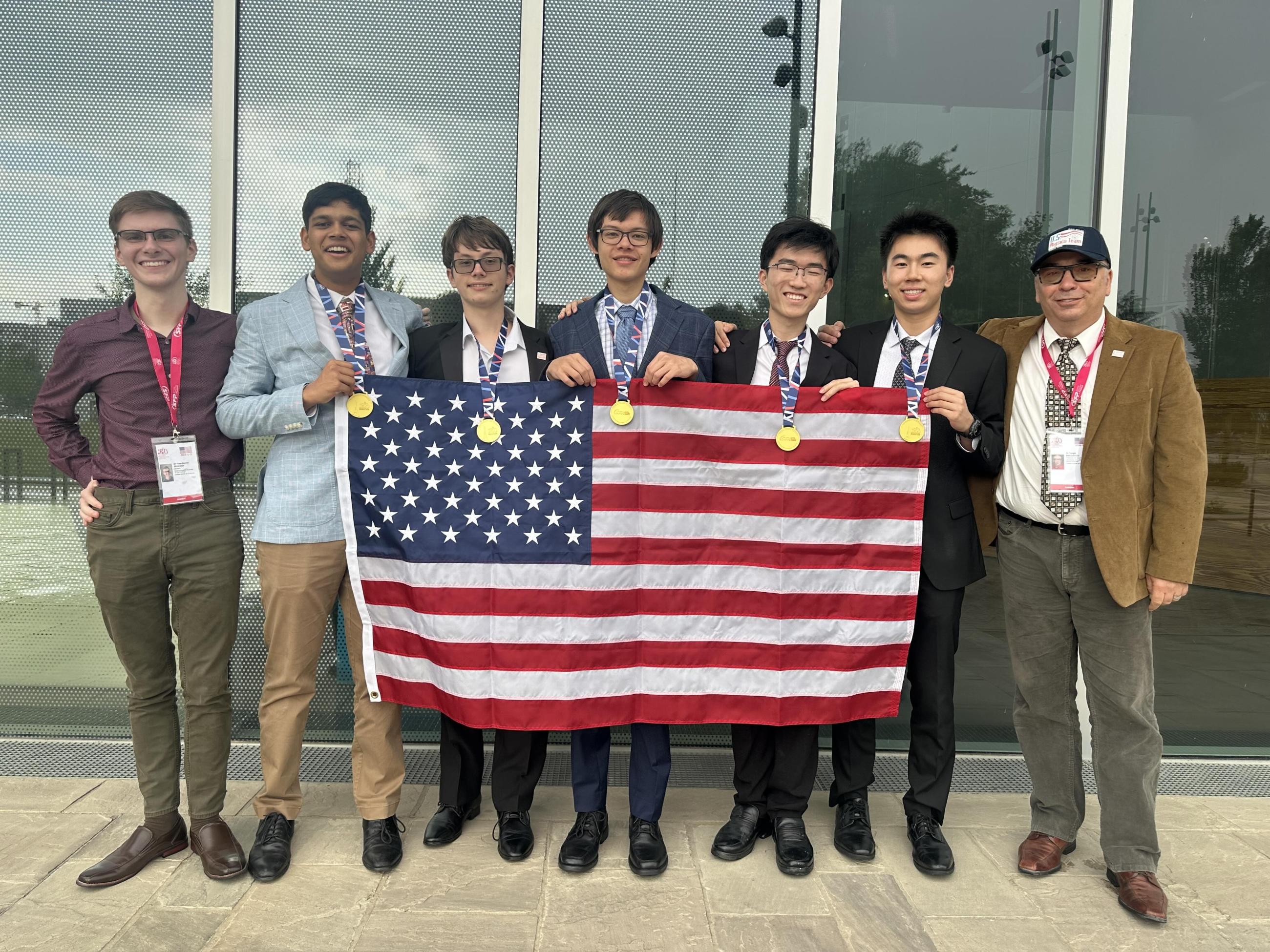
The 2025 U.S. Physics Team celebrates after securing five gold medals in Paris. Pictured with their medals are (from second left) Agastya Goel, Feodor Yevtushenko, Joshua Wang, Allen Li and Brian Zhang, joined by coach Evan Erickson (far left) and UCSB's Tengiz Bibilashvili (far right). (Tengiz Bibilashvili/UC Santa Barbara)
Identifying the nation's best
The path to a gold medal is a year-long marathon of intellectual rigor. Organized by the U.S. Physics Team of Coaches under the American Association of Physics Teachers (AAPT), the process begins with the “F=ma” exam, a test administered to nearly 6,000 high school students nationwide. From this vast pool, only the top 400 are invited to the next stage, the USA Physics Olympiad exam.
The 20 highest-scoring students are then named to the U.S. Physics Team and attend an intensive training camp at the University of Maryland. From this distinguished group, five are ultimately selected as the traveling team to represent the United States, in addition to an alternate.
“These kids are a different species of humans. They think much faster than any of us can,” Bibilashvili said. “You can teach them in a half hour what you would teach an honor student for a couple of weeks. They just absorb instantly.”
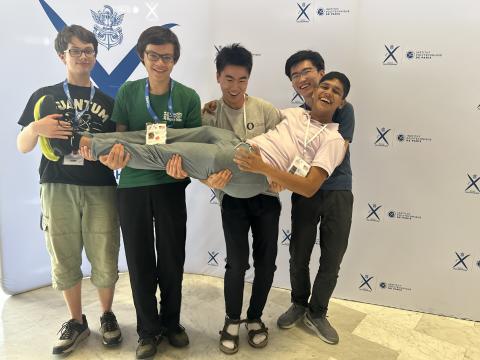
He also noted their collaborative nature, which defies old stereotypes. “I was told to prepare for icebreakers, but when I picked them up from the airport, they were already talking like best friends,” he said. Social media also helped the students find one another, build community and become more engaged, Bibilashvili explained.
The UCSB Advantage: A world-class training ground
For the final, critical phase of preparation, the five-member team and alternate member, Raymond Feng, traveled to UC Santa Barbara for an immersive mini-camp. At UCSB, the students were submerged in the environment of a world-leading physics department through mentorship from its faculty. To prepare for the IPhO’s demanding five-hour lab exam, they honed their skills by tackling a curated set of experimental problems brought back from previous International Physics Olympiads.
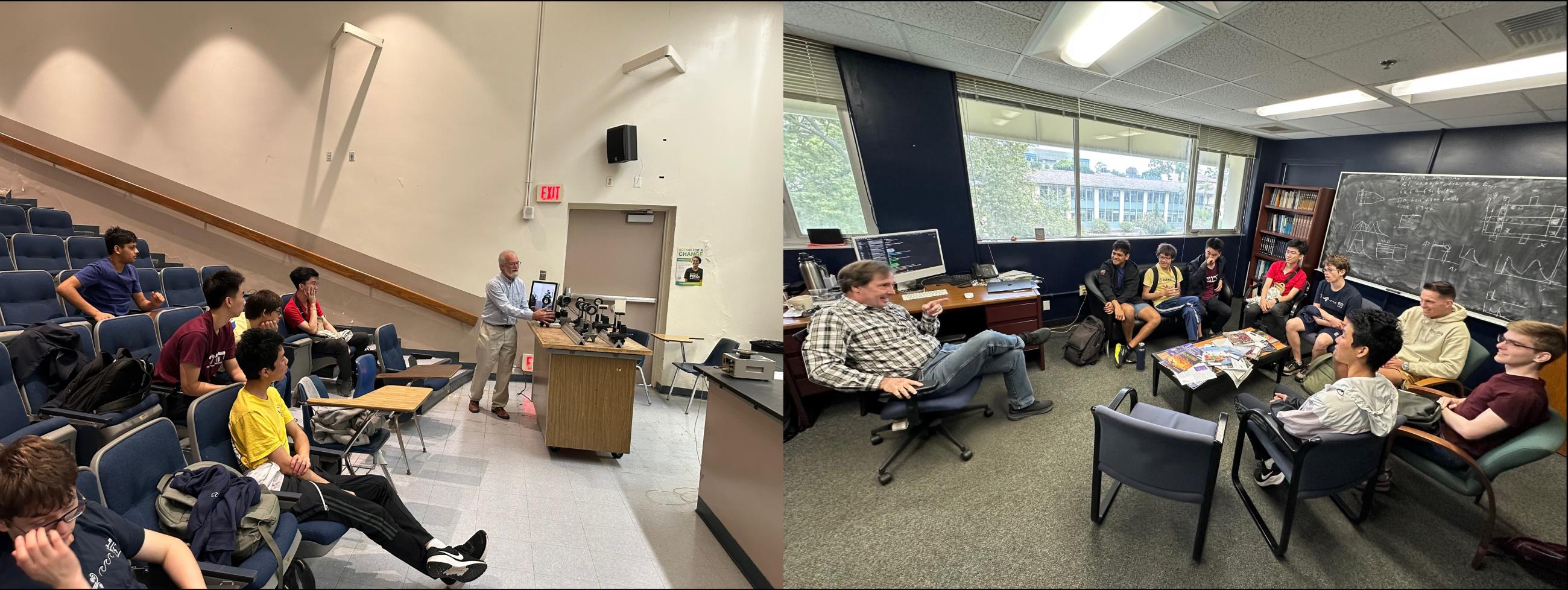
At UCSB, the team benefited from hands-on mentorship, including a lecture demonstration from facility manager Louis Grace (left) and an informal meeting with Physics Chair David Stuart (right). (Tengiz Bibilashvili/UC Santa Barbara)
The comprehensive support from the Department of Physics was foundational to the mini-camp’s success. The commitment began at the top, with department chair David Stuart providing full access to departmental labs and delivering a presentation on contemporary physics research.
Crucial help also came from colleagues involved in lab classes, particularly lecturers Paula Popescu and Anatoliy Dovbnya, who provided invaluable assistance with lab space. Lecture demonstration facility manager Louis Grace also played a special role in preparing the experimental setups. “He did miracles,” Bibilashvili said. “Whatever was not working, he repaired. Whatever was lost, he made from scratch.”
Grace was assisted by Harry Kroft ‘27, a junior physics major in CCS. Adding another layer of specialized training, professor Everett Lipman, a former Olympian himself, granted the team access to his new, state-of-the-art optics lab in Phelps Hall, offering invaluable guidance on handling sophisticated equipment.
The students also benefited from engagement with UCSB's broader scientific community. Lars Bildsten, director of the Kavli Institute for Theoretical Physics, met with the team. Additionally, Nobel laureate David Gross, who has mentored the team for the past two years, was not in Santa Barbara but offered his encouragement via email. The students also heard from David Rower ’19, a CCS physics alumnus. After completing his PhD at MIT, Rower now works at Google Quantum AI in Santa Barbara and returned to campus to give a lecture on quantum computing. This access to leading figures in the field provides a unique source of inspiration for the young physicists.
The department’s excitement for the camp was widespread. “It has been wonderful to see the commitment and excitement across the department for the training camp”, noted physics department chair David Stuart.
This supportive spirit extended across the Atlantic. As the team traveled to Paris, UCSB graduate students gave them a personal tour of CERN, Europe’s premier particle physics lab. Stuart noted the students’ effect on their guides, adding, “The enthusiasm and curiosity of the team was infectious for the tour guides!”
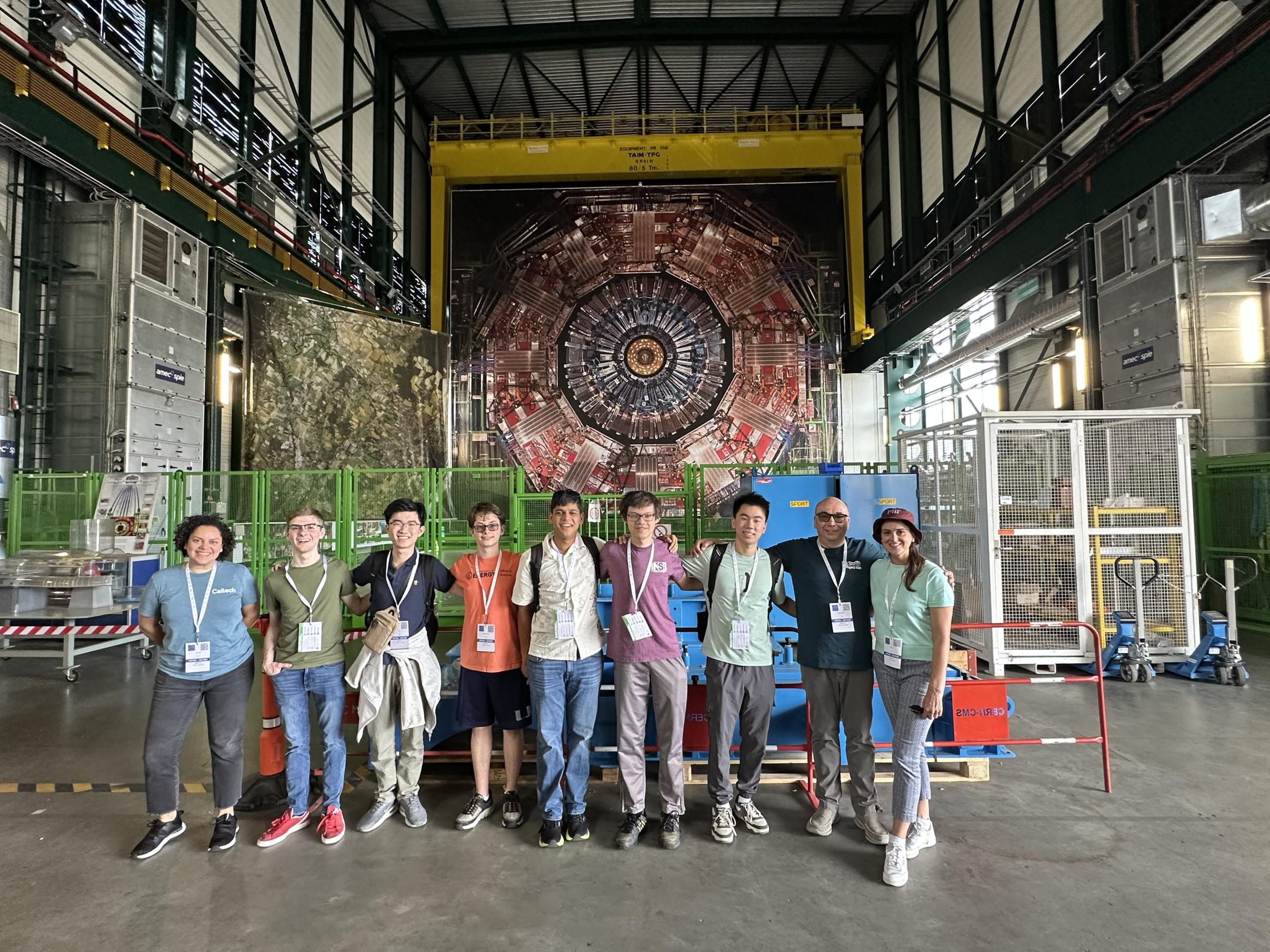
UCSB graduate students provide the U.S. Physics Team with a personal tour of the CMS experiment at CERN in Geneva, Switzerland, showcasing the global reach of the university's physics community. (Tengiz Bibilashvili/UC Santa Barbara)
A cycle of mentorship
Bibilashvili’s appointment as academic director in 2021 is the latest chapter in his long-standing commitment to physics education. This dedication dates back to his time in his native Georgia, where from 1998 to 2002 he successfully coached the national team before moving to the United States.
He has extended this spirit of mentorship by building a coaching staff that includes a mix of UC Santa Barbara students and alumni. The team features Natalie LeBaron ‘22, Kellan Colburn ‘21, Samuel Gebretsadkan ‘23 and current student Harry Kroft ‘27. This cycle of mentorship — where alumni and students alike guide the next generation — highlights the lasting impact of a UCSB education.
The team’s victory has earned national recognition. At the invitation of Michael Kratsios, Director of the White House Office of Science and Technology Policy, the students visited the White House on Sept. 22 for a meeting with the President.
“We are all so incredibly proud of our U.S. Physics Olympiad team and grateful to our Professor Bibilashvili for his excellent coaching,” said Timothy Sherwood, dean of the College of Creative Studies. “UC Santa Barbara is an amazing place to study Physics, and our students are lucky to have a chance to work with him through the rest of the year.”